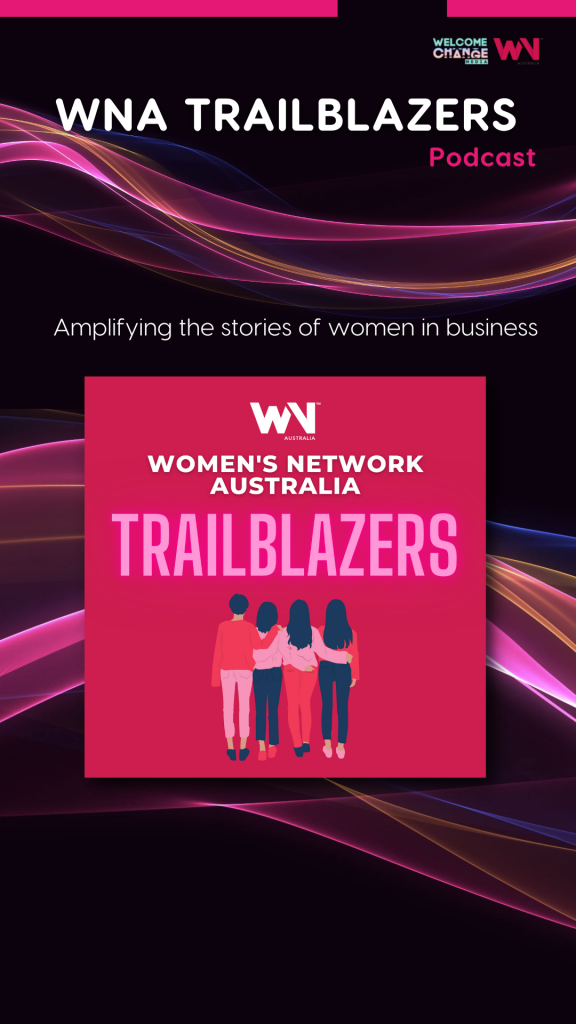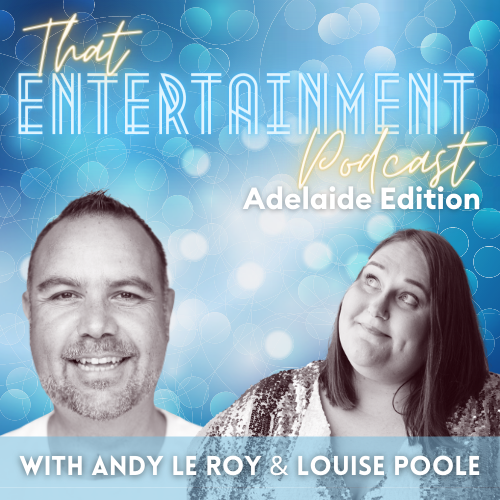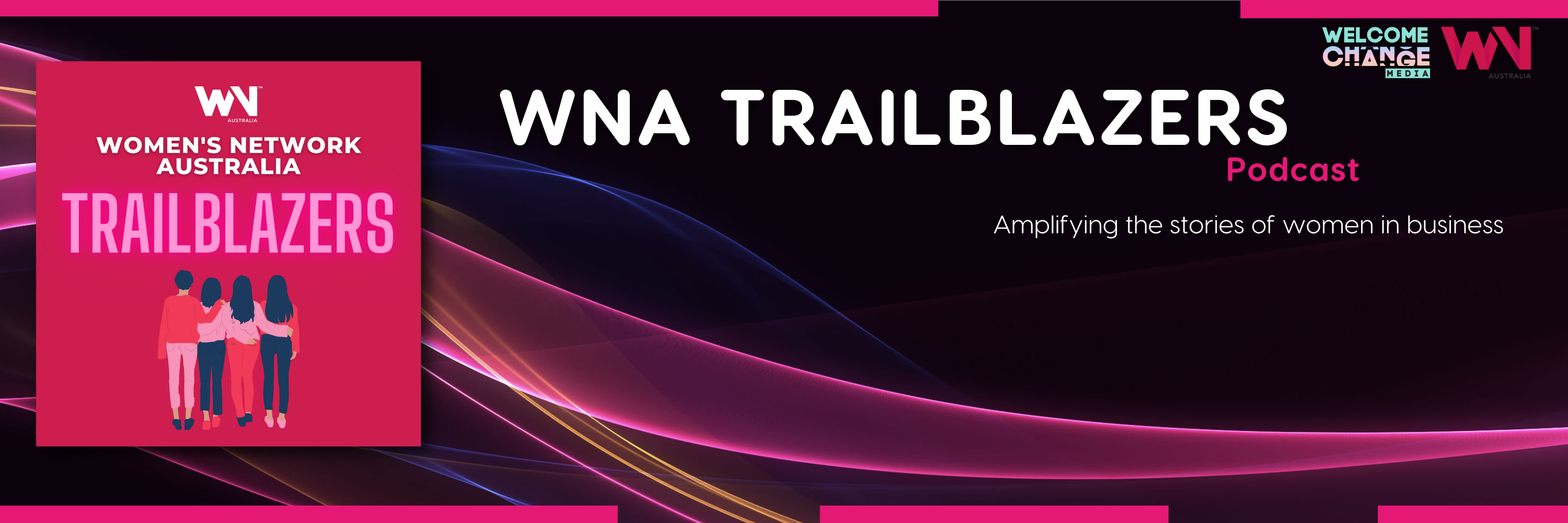
Episode 2 - Networking with Lynette Palmen AM
Founder of Women's Network Australia
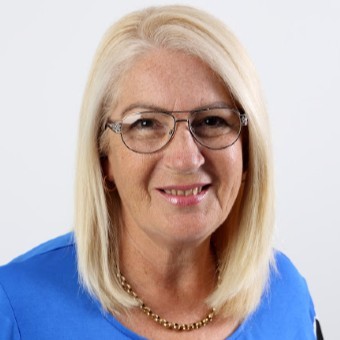
Lynette Palmen AM, Founder of Women’s Network Australia

Cheryl Gray, CEO, Women’s Network Australia
Some days it can feel like we’ve got so many challenges ahead of us, roadblocks to success as women, whether we’re running our own business or focused on progressing our career through a company or other organisation. It’s because of Trailblazing women like Lynette Palmen AM, founder of Women’s Network Australia, that some of the things we now take for granted were brought to light and progress was finally made.
Less than fifty years ago, women were forced to resign from their jobs when they fell pregnant, and although this was slowly removed from government and business policies, other barriers remained around access to child care or simply being invited to the table so we could share ideas to grow the business and our career.
Enter Lynette Palmen who, 30 years ago, started growing Women’s Network Australia starting with a group of four colleagues, sharing ideas and contacts over lunch, growing into the massive, supportive network you see today.
In this episode, Women’s Network Australia CEO, Cheryl Gray, talks to Lynette about her motivation, challenges and successes in the first twenty seven years.
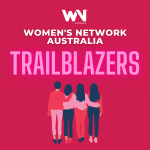

Jump to: Episode Transcript | Show Notes | Gallery | Guest | Top of Page
Show Notes
Here’s some things mentioned during the episode.
Lynette Palmen AM
Lynette Palmen AM is a mentor, coach, facilitator, speaker and small business educator. The Founder of Women’s Network Australia, she established the organisation in 1990 leading it until she stepped down in 2017.
Recognised for her leadership skills, financial acumen, innovative thinking, established networks and connections, Lynette continues to contribute her professional expertise and knowledge to private and public sector board directorships.
The recipient of a Queen’s Honour, Lynette was appointed a Member in the General Division of the Order of Australia (AM) for service to the community, particularly through promoting public awareness of existing and emerging issues affecting women, and for providing her cause related marketing and fundraising expertise to a range of charitable and not-for profit organisations.
‘Network News’ published 1994, featuring Lynette Palmen on the front page:

Transitioning from her role as Managing Director of Women’s Network Australia in June 2017, Lynette now shares her expertise and knowledge on small business, finance, community engagement, diversity and entrepreneurship as a Non-Executive Board Director across both the public and private sector boards.
Current and Past Board Appointments Include:
Deputy Chair – Premier’s Council for Women QLD
Chair – QLD Working Women’s Service
Board Member – Lord Mayors Domestic Violence Committee
Co-Chair – Australia’s CEO Challenge
Board Member – Prostitution Licensing Authority
Board Member – QLD Institute of Medical Research
Board Member – Mater Hospital Trust
Board Member – Centre of Education & Research – Griffith University
Steering Committee of Women’s Research and Employment Initiatives Program
Connect with Lynette on LinkedIn:
Episode Transcript
Read the Transcript Online
00:00:00 Lynette Palmen
As far as I’m concerned, you’re better off having an opinion even if it’s wrong than having no opinion at all, take control of the conversation and participate in it. It’s OK to be wrong. You don’t have to be right all the time.
00:00:14 Cheryl Gray
That’s Lynette Palmen AM who founded Women Network Australia in 1990, and this is WNA Trail Blazers.
00:00:21 Louise Poole
WNA. Women’s network Australia. WNA Trail Blazers. Amplifying the stories of women in business hosted by Women Network Australia CEO Cheryl Gray and me Louise Poole, Managing Partner from podcast and content production business Welcome Change Media. Proud media partner of Women’s Network Australia.
It might be easy to see where some women are today in the business world and assume that those opportunities have always been available. But everything that we gain has been hard fought for and 30 Years ago it was even more rare to see women in leadership positions. Someone who was at the forefront of leading positive change for women and as a result started this very network that we’re a part of is Lynette Palmen AM, who current Women’s Network Australia CEO Cheryl Gray will be chatting to in this episode.
Cheryl, let’s talk about using your voice.
00:01:14 Cheryl Gray
Yes, look it seems like an obvious and natural thing for many of us.
00:01:18 Louise Poole
But we’re using it now.
00:01:19 Cheryl Gray
Well, we are using it.
No, but it’s such a powerful tool, but it is something that a lot of people struggle with. Yeah, and you know, for women in business in particular, and at a time when Lynette and colleagues formed this organisation, women having a voice was not seen as a good thing necessarily, you know.
So there were individuals who stood out, and there were many who were potentially highly discouraged from finding a voice and from having a voice.
So I think the role that Women’s Network and other groups played was really to help women see they had a voice they should find the opportunity to use it and use it for good. You know for their own good for the good of the community, for the good of their families, for the good of their workplaces and their colleagues and they did
00:02:14 Louise Poole
And because they used their voice 30 years ago we’ve been able to build on the shoulders of giants and use ours now.
00:02:18 Cheryl Gray
Absolutely. But you know it’s still a theme that we continue to work with through. Women’s Network Australia is helping women to find their voice and there’s lots of reasons why women still may not yet have found their voice. It’s there, but it’s just about discovering it within them and bringing it forward.
So yeah, really really important tool that we need to all learn and harness and manage and control as well.
00:02:43 Louise Poole
So let’s listen to your chat. This episode with Lynette Palmen AM, founder of Women’s Network Australia, who built it up over 27 years, having started with just a modest network of four women.
00:02:53 Cheryl Gray
Four women really working together and deciding they wanted things to be a bit different.
00:03:00 Cheryl Gray
Welcome Lynette. Lovely to talk to you again. It’s great to be the current baton holder of Women’s Network Australia which you founded back in the 90s and I’d really love to just share with those who are listening how Women’s Network came to be.
00:03:18 Lynette Palmen
Thanks Cheryl, and it’s wonderful to know that you are the current baton holder and at the legacy is progressing.
Women’s Network Australia started well. The idea sort of started in about ‘88.
In my mind I was working in the financial sector and a senior management role. The only woman working for that company across Australia in amongst 40 more senior members. So it was a bit isolating, but luckily I used my voice well and managed to fight the battle, but in 1990 over that two year period I had decided that I would get some girlfriends together who were in the same positions as myself and just meet regularly to, you know, swap information, work out how we do the, the strategies that.
So we could progress, share ideas, share referrals, introduce each other to people and really, it was from those four girlfriends that the idea of Women’s Network Australia started, so it was really formalising what had been a very loose arrangement, and women started to say, oh, could I come to that lunch please so you know our lunch for four turned into lunch for 10. And then lunch for 15 and then we decided that we’d invite someone from the group to address each of the functions. So then of course I had to find a venue to hold those luncheons in.
You know the rest is sort of history, but the reason behind it was that women were isolated in senior positions. In my role, I was having conversations because I was working at a financial and investment sector with women who were not reaching financial independence. Were leaving divorces with no money, had no skills other than that they you know were working for someone and that they are now having to actually balance raising children on their own and holding down a job. So there was sort of this move in the 1990s. The economy wasn’t great and there was a move towards micro business ownership. So women were tending to look for flexibility and they still are.
I mean COVID has given it a good push in the right direction, but the only way you get
flexibility with workplaces in those days was to actually leave and start your own business and are seeing that trend happening.
However, you know they didn’t necessarily have the skills. They didn’t have the confidence they didn’t have the networks to tap into they didn’t know how to write a business plan and marketing plan and they collectively wanted to educate themselves, or learn and interact with other women to do that, so you know that along with a ll the other issues were around at the time, There was other women’s organisations around when I started women. Most of those organisations were in the old format.
’cause we get together and I won’t name any organisations. But they were around 30 years ago, you know.
We get together and we have a meeting once a week or once a month and we have a charity of choice and we all get together and we work towards fundraising for that charity. Whereas a mother who is working full time as single with two children, in a corporate position and at university, just wants to write a cheque, so I thought there’s other women like me surely.
You know they don’t have the time to be baking or at a street stall or whatever, and so there are these other women that, they will just write cheques to their favourite charity or the organisations such as Women’s Health Australia will take care of, but here’s an easy way.
Donate this. This is what we’re doing. We’re buying 1000 pairs of undies for homeless. Women were doing this with and they would just give because they could. You made it easy.
For us, so I think it’s about placing yourself in the proximity of opportunities, but that’s no good if you don’t recognise.
You have to recognise and act on them.
00:07:17 Cheryl Gray
Can we just talk about some of those issues? ’cause they’re quite significant? Affirmative action. I recall at the time was a big deal and there was a big build up to the affirmative Action Act legislation coming in. But there are things now that I think a lot of women take for granted.
You know that concept that you’d get a job based on merit who would have thought?
00:07:40 Lynette Palmen
Yes, well in 1990 the number of women in senior roles was quite slim. There was no pay equality.
There were very few things our politicians and if they were, they only got there ’cause they stood in an unsafe seat and the women, they were usually disposed of by begging being given a poison chalice.
You know, if you’ve got a problem, then you give it to a female politician and then of course she ends up being thrown out. There was next to zero.
So when Women Networks started, membership cards were index cards written out manually, and certificates and membership kits were typed on typewriters.
00:08:19 Cheryl Gray
Wow, that’s incredible.
00:08:21 Lynette Palmen
You know banks would not lend to women unless the husband went to the interview. You know, we tend to forget all these things, but it’s in my mind.
It’s part of my lifetime. Yeah, you know, if you’re born in 1990 or 97, you haven’t seen these things. I worked originally in a government where I had to leave, because if you felt pregnant Queensland Government you had to leave up until 1976 I think that was the case and banks, if you worked for any of these people, you had to actually leave.
So there was a lot of work to be done and just maybe 6 percent, I think it was when I started women were on the top. There’s been a lot of change over the years, and which has been hard fought battles by women, I mean one of the things that Women Network gave me was access to be able to lobby government, go onto boards you know with work and family boards, all sorts of different initiatives that were started up to try and battle it. And of course, superannuation.
All these things have actually eventuated.
00:09:28 Cheryl Gray
Great, and one big one, of course, was child care access to affordable childcare, which just wasn’t around then, so it certainly made work and family pretty difficult.
00:09:38 Lynette Palmen
It did, which was another reason that women started their own businesses, but flexibility to do. But, you know, bear in mind we’re looking after children. We’re running a business like doing already childcare was the domain of women then unfortunately had very little to do with.
No expectation they would, and there’s certainly no paid maternity or if you had a child you just took the time off you used your holidays and your holiday pay is sick pay and that’s it. You just didn’t get paid.
The chances were, anyway, your job wouldn’t be there when you got back ’cause you’ve now had a baby so you’re a mother and of course you were living that at that time as well.
00:10:20 Cheryl Gray
You were a single mum to children and growing a new business, how did that play out for you?
00:10:24 Lynette Palmen
I was actually at Uni and held down this senior position and having a young child and was a single parent.
So obviously family support was very important in those days, and no partner obviously. But you know, having that family support around you made the difference, obviously.
When my son was old enough, he could go to child care.
But that race to the child care centre when you’re in a corporate job at 6:00 o’clock, or get charged a dollar for every minute. It was challenging so the easiest way to do it was get yourself into a senior position where you could actually have some flexibility.
00:11:01 Cheryl Gray
So was that about also something that you wanted to share through the network to actually give other women that opportunity to have that flexibility as well.
00:11:10 Lynette Palmen
Oh, definitely definitely. So at that stage it was either get yourself into a senior position, progress within the company you’re in or start your own business.
Or don’t have children. Choose not to have children because it was virtually impossible to find childcare spots that you could afford. That was another reason people just left work because it just wasn’t worthwhile. In those lower paid positions you lose all of your money.
00:11:35 Cheryl Gray
It’s one thing to sort of go from sitting around with some girlfriends and starting a network you must have then found yourself in some situations where you were asked to comment on things or give opinions on things.
Did you kind of have those moments when you kind of thought what am I doing here? Or did you just take it all in your stride?
00:11:54 Lynette Palmen
No, I lived it. I lived it. I loved it. I had a few people, I guess, that had their ear to the ground that at grassroots level, with women gathering them in rooms sucking up all the information I could about them and then working out what strategies could be in place within the organisation to progress their agenda forward.
Some agendas, you couldn’t, others you could, and yes, a lot of media commentary obviously radio was big in those days. The Courier mail developing relationships with the media and so much so that we had some media core service in Women’s Network because in the early days you could ring me and say oh I’d like to speak to someone who used to be a pig farmer who now develops and creates a perfume range and I’d say I’ve got just the person.
And so I could retain this knowledge. However you know, it really got to the stage when it started expanding, but I did have personal experience that everyone that was joining. Obviously this was as technology took off and websites became possible and online we could create online, people would join the organisation and we’d certainly do our membership form where they could learn all about what access they had to services within the organisation, but I didn’t know everyone’s absolute background and history, so that is really have a media call service started where the journalists and newspapers, whatever, would come to me and say this is what we need and they really would pump that out as an alert to all the Members and give them an opportunity to comment in the media.
It was about sharing all the opportunities that were available and doing that for women across Australia.
00:13:39 Cheryl Gray
That switch from and I’ve said to you before. I love having the hard copies of the newsletters and the magazines.
It’s like a historical archive of working women in the past 30 years, and it’s so rich in terms of the issues, but also the way things are done. And you could also see from the network the transition from the pre Internet, pre digital days into yes we have a website. We’re doing things online. We’re doing things differently. So you had to be a trailblazer in terms of picking up that technology and new ways of doing things.
00:14:13 Lynette Palmen
Yes, yes. I get amazed by listening to people go, you know, Zoom’s taken off during COVID, but at Women’s network we’ve been using them since 2014/15 with our members, so it’s something I’m an avid reader. I read everything they look at.
What trends are happening? And yeah, it was. That’s just the ability that I had so I’d look at something and think well, how can we use that?
00:14:37 Cheryl Gray
When you first started, did you ever think that it would be a national network of women? That it would be around for three decades, did you have that vision in mind or did it just kind of happen?
00:14:50 Lynette Palmen
Not at all I imagine the need for it would continue, although the agenda of what that need was would change as women involved, obviously.
But no, I didn’t imagine that, but of course, as you’re doing your planning and you know looking at where you’re taking an organisation each year it evolved and you know new ideas.
If I’d still been there, I probably would have taken a completely different direction to what’s happened since 2017, but that’s me. So at some point in time you have to let go, obviously, which was very difficult and due to illness, unfortunately, which I’m still battling. But you know, the brain is still very active.
00:15:31 Cheryl Gray
What was the reaction though when you first got going to those colleagues in the financial sector? And more broadly, was there any negative reaction?
00:15:42 Lynette Palmen
Not really, because I’d been doing financial independence seminars for women right out of that role. Then my passion was women ,right? An actual fact. Men were the very first people that gave me the office space. The time to be able to do it.
The computers. Partially paid staff so you know men were really supportive of. It was in the financial services industry and I think the other thing when we started Women’s Network Australia, men were able to join Women’s Network Australia.
00:16:15 Cheryl Gray
If there are any men out there listening, you’re welcome to join.
00:16:15 Lynette Palmen
Be considered part of it. There’s also a lot of men that are very supportive. That could be because of their target market for their product they find is mainly women, it could be because you know they’re supportive of daughters.
And he hasn’t thought it’s just more subtle than the unconscious bias and whatever, it is still there. But you know, organisations like Women’s Network Australia I hoped gave women the confidence to use their voices because as far as I’m concerned you’re better off having an opinion, even if it’s wrong than having no opinion at all. Take control of the conversation and participating in it. It’s OK to be wrong. You don’t have to be right all the time, you just have to say that was wrong or whatever, so getting women to use their voices was a big part of Women’s Network, and that happened within the events teaching women to stand up and say something for 30 seconds about themselves was so painful for many women, they’re so frightened of being judged.
And I would say to them, this is a safe place make mistakes here, this is practice. Learn what to do here. So then when you have to go out into a world that isn’t supportive then, is judgmental, at least you practiced. You’ve had some learning. To use their voice is very important, so no. I would say I received support from the industry I came from and I didn’t just do it. I continued to work full time while running it.
00:17:44 Cheryl Gray
Yes yes well.
00:17:45 Lynette Palmen
You know, for that three year period I continued to work and then came the thing that we just can’t continue.
00:17:52 Cheryl Gray
Was that a difficult choice for you, or was it just you knew that that pathway was taking you there?
00:17:56 Lynette Palmen
No, I just I just knew then it was time to jump and make it happen, basically.
00:18:02 Cheryl Gray
You would have had a lot of achievements, a lot of successes over that time. Are there some that stand out more than others? Things that you really are very proud of?
00:18:11 Lynette Palmen
I think my ability as the Managing Director of Women’s Network Australia, one of the wonderful things that came from it was my ability to participate in my charity work. They aligned with each other so you know my heart work was domestic violence, financial poverty for women, homelessness. All these things, and what it allowed me to do was to combine both those.
00:18:38 Cheryl Gray
It’s really interesting you say that because they’re the three charity themes that we are really working hard to support. You know domestic violence. Obviously, financial independence is something we’re talking to a number of other partners and collaborators about, and we just had an amazing event in Melbourne where one of our Members is participating in the CEO Sleepout, is an ambassador for Vinnies CEO Sleeperout, you may know Marianne and you know she was so passionate and just incredible to hear all of those charities, and so they’re still going the, essence of what you were passionate about is still there, which is really great.
00:19:14 Lynette Palmen
And some of those things came about, like the CEO challenge, which was, you know, the Lord Mayor of Brisbane approached me about that and said, you know, would you be interested in being involved in this and helping us with this? You know that came out of Women’s Network?
Amazing things. There was a shelter, homeless women’s shelter at Spring Hill and you know we supplied 1000 towels, 2000 pairs of underpants and that fund raising, it used to shut at 9:00 in the morning and open at 5 so the homeless people, females, in that shelter, there was only 19 beds, were tossed out at 9:00 o’clock and it reopened at five. Well, we managed to get that reopened. Members went in and held events such as teaching them how to do their resumes, teaching them how to scrapbook, teaching them how to knit. Members kept them busy during the day because there was no funding to keep it open, but thank you to Judy Spence the minister at the time, we managed to get funding for it and get it opened, so that it was open, so that , and so many things and lots of charity work that I did.
And I guess that culminated in me receiving the Order of Australia. My AM, you know, for the work that I’ve done, so can I put my finger on one thing? Not really. Because my AM belongs to everybody, all the women that had participated so the awards, the Executive Woman of the Year awards. They were absolutely amazing.
We ran that programme for eight years and then it integrated into Telstra Business Woman of the Year awards. Yeah, lots of lots of different moments that they all come to create the essence of me, I suppose.
00:21:01 Cheryl Gray
And it is really humbling to know that those themes and a lot of that work is still going strong and coming through. And what we do, which makes me feel really humble and you and I have talked previously about particularly some of those issues, and that sense that the more things change, the more things can seem to stay the same. You know, the unconscious bias.
You mentioned there’s still a lot of issues that are out there for young women and girls to have to deal with. I’m certainly looking ahead.
What does WNA look like in the next 30 years? It will be really interesting to see how we tackle those issues moving forward.
00:21:37 Lynette Palmen
Well, I think social media has had a big influence on the health and well being of young women. Their level of confidence, their level of body image, all these things have had a big influence on how young women progress, so I guess support for the mental health for young women but let’s not forget that the biggest growth, poverty level is women over the age of 55 who are now sleeping in cars and tents, and there’s no social housing for, so you know, we’ve got a whole new set of problems to address that affect women.
00:22:13 Cheryl Gray
Yeah, absolutely, and that is a big one that we will be focusing on. Certainly over the year ahead, and you mentioned the decision to move on and some health issues that you’ve had to deal with as a result, how do you regard your time with WNA?
00:22:28 Lynette Palmen
Well, I read things now and I can’t believe I was capable of doing. So you know my mobility issues. I have mobility issues, so the thought of the fact that you know I.
00:22:40 Cheryl Gray
Because you would have been, you would have been travelling. You would have been going to board meetings to government meetings all the time.
00:22:47 Lynette Palmen
Yes, yes, and now it’s a challenge to actually get myself organised to go to a doctors appointment so I look back at it fondly thinking you know, all these are memories. You could do it. Plus the thought that I could be in the office and the girls that look at me and go, you know you’ve got a flight to Sydney in an hour and a half and I go oh, sure, no worries. Rush myself. Get organised, pack everything in a suitcase and I was doing a Sydney-Melbourne-Hobart run that particular week, yes.
Yes, and that I could pull it all together. Yes and, you know, stay sane and get myself into the car drive to the airport, get myself on the plane and then pull that off over three days then.
But you know, I loved it once I got there, and once I started setting up the rooms and I loved it.
I loved it and you know the chance to actually, you know, catch everyone and catch up with them and work out what they were doing and look at their trade display tables as they arrived and started setting them up and find out what happened in their business that month.
Looking back at it, it’s got wonderful memories. Wonderful memories. Not that I don’t do anything these days, but you know, it’s very different to the life I led when I would put in 70 hour weeks, easily, and you know it was never work, it was not work when you love what you’re doing.
When you love what you’re doing, it didn’t feel like work. It felt like a hobby and being able to integrate your children into that made it a lot easier, so I’m not one for this balancing, balancing work and family. I’m about blending.
00:24:25 Cheryl Gray
Yeah, I think that’s great. I’ve always regarded my career as part of that balanced blend as well, and I think it’s really important for our children to see that you can have a career, you can have a business. You can do these things. You can really lead by example, and it’s not at their expense.
00:24:42 Lynette Palmen
So will they learn things by being in the office and hanging around, and I mean, not that Madison was learning much at 26 weeks.
00:24:51 Cheryl Gray
You never know.
00:24:53 Lynette Palmen
All in 26 weeks, but you know but that was the other thing and being able to run your own business, you know I could actually set up a creche at work and have a room and not have to use child care because I owned the business.
So one of the sensible things I always say to women you know they’re trying to balance or blend their work and family, and they’ve got a micro business and they’re at starting point. Make sure the very first secretary or receptionist or admin person you employ has a background in child care. It’s the best for themselves and for you.
Because when you can’t do something you know they can step in, so you’ve got that as a luxury of an admin person that has also worked in childcare and there’s a lot of people back in my day, which was 25 years ago when I had a baby, Madison, that were wanting to get out of childcare, that didn’t know how to get out of childcare, so you know I developed a relationship whilst Madison was going to child care.
And with this girl and she said to me I’d love to work for you. I said “done, that’s brilliant.”
So it’s a matter of I think I’m doing the blending thinking strategically. There are ways of making your home based business or micro business or small business family friendly and just thinking about ways to work smarter.
00:26:24 Cheryl Gray
Well, I just want to thank you for sharing what you’ve shared today, but also being a trailblazer and paving a path for women and helping them along the way because it’s one thing to kind of go out there and do it, it’s quite another thing to bring women along with you, and I can’t imagine how many women you have had contact with over those 25 years. You must get a lot of Christmas cards, I’d imagine.
00:26:47 Lynette Palmen
Yes, and you know people who ring me who say, do you know, you changed my life. Yeah, that’s a special feeling.
And I go really?
Don’t you remember we were at Mach 2 throughout this thing and this is what happened and I said yes, you know, like it is amazing, but you know at Women’s Network Australia we lift while we climb. Leave no one behind. If they want to come and they’ve got their arm out, lift them and support them.
00:27:12 Cheryl Gray
That’s lovely, well, I hope I can as I say, continue it on and it’s really wonderful to hear a lot of the similarities with where I think we’re going moving forward. So thank you so much for your time and thank you for everything that you’ve done.
00:27:26 Lynette Palmen
My pleasure, thanks a lot and best of luck and thank you for continuing to follow the path.
00:27:34 Louise Poole
Listening to Lynette. I am absolutely in awe of how much strength it probably took her and the audacity it probably took her as well to be trailblazing a path decades ago in his fight for women so strong.
00:27:48 Cheryl Gray
She had to do that. She had to be that person at that time. As she said I don’t have any regrets about what I did and how I did it because she couldn’t have regrets. It was tough. There was no one there to call and back things up and say, well, if it doesn’t work out, you know this can happen.
00:28:06 Louise Poole
I mean, it’s almost a case of, you know, the more things change, the more they stay the same.
00:28:10 Cheryl Gray
Really interesting ’cause there’s still things that we talk about.
00:28:12 Louise Poole
I know we’ve made progress, but we’re still talking about domestic violence. We’re still talking about homelessness.
00:28:18 Cheryl Gray
Financial independence for women that is, like, literally I’m pushing that trying to get stuff and it is interesting that yeah, a lot of the things that she did, we are still doing like we are using the network to create a platform for charity and even the charities are similar.
00:28:36 Louise Poole
Yeah, the trailblazing is ongoing, which is why it’s so important for us to be amplifying the stories of women in this series as women we’re in this together and we’ve still got a long way to go. So Cheryl, how can our listeners connect with Women’s Network Australia?
00:28:50 Cheryl Gray
You can find us on womensnetwork.com.au and we’re also on Facebook. We’re on LinkedIn. We’re on Instagram. Just look for Women’s Network Australia.
00:29:01 Louise Poole
Next time on WNA Trailblazers.
00:29:03 Dominique Lamb
We also know that there’s been a real interest in just that experience level, just kind of different types of one on one interactions with in store that seem to be incredibly popular and is boding well in terms of the bottom line of many of these retailers.
00:29:18 Louise Poole
Dominique Lamb, CEO of the National Retail Association, chats to us about the current lay of the land in the retail sector with some fascinating insights she brought back from the World Retail Congress in Rome.
Women’s Network Australia Trail Blazers. Amplifying the stories of women in business. Follow us from this podcasting app and be the first to hear new episodes.
Excited to Share your story with our network? Follow the Contact US link in the show notes to let us know. Women’s Network Australia Trail Blazers is a Welcome Change Media production.




